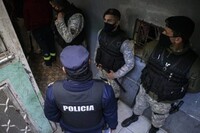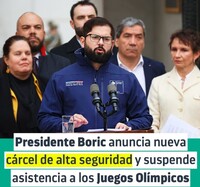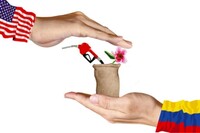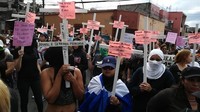Al Baradei invita gli esperti di terrorismo nucleare ad una conferenza internazionale sulla sicurezza
Security strategies, for many centuries, have been based on boundaries: the strategic placement of cities and borders to take advantage of natural barriers; defences that relied on walls, trenches and armadas; and the use of ethnic, religious or other groupings to distinguish friend from foe. In the 20th Century, the advent of airplanes, submarines and ballistic missiles began to undermine this approach to security — by enabling the remote delivery of destruction on a scale previously not envisioned.
But the change that has altered the international security landscape the most drastically is, in fact, globalization. The global community has become interdependent, with the constant movement of people, ideas and goods. Many aspects of modern life — communication, the global marketplace and, most recently, the rise in international terrorism — clearly indicate that our understanding of and approaches to national and international security must be adjusted, in keeping with new realities.
Nuclear Security and the Protection Against Nuclear Terrorism
The security of nuclear and other radioactive material and associated technologies has taken on heightened significance in recent years. The IAEA has been active in the field of nuclear security for many years, but as you are all aware, the events of September 2001 propelled the rapid and dramatic re-evaluation of the risks of terrorism in all its forms — whether related to the security of urban centres, industrial complexes, harbours, oil refineries, air and rail travel, or activities involving nuclear and radiological material. Terrorist attacks since that time, in Spain, Indonesia, the Russian Federation and elsewhere, have continued to keep these concerns in the forefront of our collective consciousness. For those of us in the nuclear field, it has become obvious that our work to strengthen nuclear security is both vital and urgent — and that we must not wait for a ´watershed´ nuclear security event to provide the needed security upgrades.
International cooperation has become the hallmark of these security efforts. While nuclear security is and should remain a national responsibility, some countries still lack the programmes and the resources to respond properly to the threat of nuclear and radiological terrorism. For these countries, international cooperation is essential to help them strengthen their national capacities. International cooperation is also essential to our efforts to build regional and global networks for combating transnational threats.
Understanding the Risks
The IAEA has categorized four potential nuclear security risks: the theft of a nuclear weapon; the acquisition of nuclear materials for the construction of nuclear explosive devices; the malicious use of radioactive sources — including in so-called "dirty bombs"; and the radiological hazards caused by an attack on, or sabotage of, a facility or a transport vehicle.
These risks are real and current, but they are not all the same. While the probability of a nuclear explosive device being acquired and used by terrorists is relatively small, it cannot be dismissed, and the consequences would be devastating. On the other hand, a dirty bomb would likely have far less impact in terms of human life, but the relative accessibility of radiological sources make it more likely that such an event could occur.
Some experts share the view of the Director General of the United Kingdom Security Service, who said in August 2003: "It will only be a matter of time before a crude version of a [chemical, biological, radiological or nuclear] attack is launched at a major Western city." To date, the IAEA´s own database on illicit trafficking has recorded, since 1993, over 650 confirmed incidents of trafficking in nuclear or other radioactive material. Last year alone, nearly 100 such incidents occurred, 11 of which involved nuclear material. While the majority of trafficking incidents do not involve nuclear material, and while most of the radioactive materials involved are of limited radiological concern, the number of incidents shows that the measures to control and secure nuclear and other radioactive materials need to be improved.
But effective and credible approaches to nuclear security are essential not only for detecting and responding to illicit trafficking, but also for the protection of nuclear power plants, research reactors, accelerators, and the array of nuclear and other radioactive materials that support these and other nuclear applications. To optimize the effectiveness of these efforts, it is important to prioritize — to focus on those facilities and activities where the risk is greatest — and to maintain a balance between security needs and the many benefits of peaceful applications of nuclear technology.
For example, the recent increase in the denial of shipments of radioactive material by commercial carriers, while driven by perceived security concerns, can be a matter of equally significant humanitarian concern — particularly when such shipments involve radionuclides intended for use in life-saving medical applications. While we should be committed to ensuring the security of nuclear and other radioactive materials globally, we should seek solutions that will equally ensure the continued delivery of the benefits that these materials and related applications provide.
IAEA Nuclear Security Plan of Activities
The IAEA´s nuclear security plan is founded on measures to guard against thefts of nuclear and other radioactive material and to protect related facilities against malicious acts. Our work has three main points of focus: prevention, detection and response.
Our first objective is to assist States in preventing any illicit or non-peaceful use of nuclear or other radioactive materials — including acts of terrorism. This requires: effective physical protection of these materials in use, storage and transport; protection of related nuclear facilities; and strong State systems for accounting for and control of nuclear material. The IAEA has been providing a range of international advisory service missions, training workshops and technical guidance documents — on nuclear security, physical protection, ´design basis threat´ assessments, and nuclear material accounting, to assist States in implementing these preventive measures.
A preventive focus has also been given to securing vulnerable nuclear and other radioactive material. Working with Russia and the USA, we are in the process of implementing seven contracts to dismantle and transport a number of disused vulnerable sources to more secure locations. Over 20 000 curies of sealed sources from Bolivia, Côte d´Ivoire, Haiti, the Islamic Republic of Iran, Malaysia, Panama, Sudan and Thailand have been conditioned for long term storage or shipped back to the original suppliers. We expect the volume of these and other high priority assistance efforts to increase.
The second objective relates to detection — ensuring that we have systems in place that can help countries to identify, at an early stage, illicit activity related to nuclear materials or radioactive sources. To this end, we have been assisting countries from many regions in training customs officials, installing better equipment at border crossings, and ensuring that information on trafficking incidents is shared effectively. The Agency database on illicit trafficking, now with a total of 80 participating countries, has proven helpful in identifying patterns of trafficking activity.
Third, we have been working with national governments and international organizations to establish and strengthen programmes to ensure that, in the event that illicit activity occurs — including acts of terrorism involving nuclear material or radioactive sources — the response can be prompt and well coordinated. To date, most such responses have involved helping governments with the recovery of radioactive sources that have been stolen or lost.
The bulk of this nuclear security activity has occurred in the past three years. Since September 2001, working in Africa, Asia, Europe and Latin America, we have conducted more than 125 security advisory and evaluation missions, and convened over 100 training courses, workshops and seminars. IAEA Member States and other organizations have been generous in providing financial and in-kind resources to fund the Agency´s security related activities. Since September 2001, the Agency´s Nuclear Security Fund has received over $35 million from a total of 26 countries — as well as from the European Union and the Nuclear Threat Initiative (NTI) — and many countries have provided in-kind support. IAEA Member States from every region have hosted workshops and regional training courses, participated in source recovery missions, provided technical insights on how engineered safety features at nuclear facilities can enhance security against sabotage, and contributed to the development of Agency guidelines and recommendations.
Cooperation with Other Organizations and Efforts
I find it gratifying that in all three areas of focus — prevention, detection and response — international cooperation has been facilitated by the efforts of international organizations, including those that have cooperated with the IAEA in putting on this conference: Interpol, Europol, the European Commission, OSCE and the World Customs Organization. Clearly, the benefits of IAEA assistance — and the reach of our limited resources — can be maximized by coordinating our activities with other international and regional organizations, as well as through the use of regional partnerships.
More than a year ago, the European Council adopted the EU Strategy against the Proliferation of Weapons of Mass Destruction, which includes initiatives focused on keeping nuclear and other radioactive material out of the hands of extremist groups. The Global Threat Reduction Initiative has been working to systematically address each facility around the world that possesses high risk nuclear and radiological materials. And many governments have already responded to UN Security Council resolution 1540, which, inter alia, called on all States to develop and maintain effective border controls and law enforcement efforts to detect and combat illicit trafficking, and to refrain from providing any form of support to non-State actors that attempt to develop, acquire, use or transfer nuclear, chemical or biological weapons or their delivery systems. The Agency stands ready to assist States wishing to strengthen their legislative and technical infrastructures in response to resolution 1540, by providing legal and technical advice, training and peer reviews.
Each of these efforts, properly coordinated and carried out, directly supports the overall objective of identifying and combating the risks of nuclear terrorism.
Focus of Future Efforts
While much progress has been made in the past three years, it is clear that the imperatives that first led to the development of the IAEA´s nuclear security plan have not lost their relevance or urgency. One of the purposes of this conference is to take stock of how far we have come, and I would hope that you would all provide your input on the vulnerabilities that still exist and the priorities for moving forward.
The Agency has been conducting a major review of its nuclear security activities, and the main elements of a revised plan of activities are already emerging. One aspect of the new plan is to complete the international corpus of legal instruments, as well as relevant recommendations and guidelines. A key legal instrument is the Convention on the Physical Protection of Nuclear Material (CPPNM). For a number of years, work has been progressing on a draft amendment to the CPPNM that would strengthen its existing provisions and expand its scope to cover, inter alia: the physical protection of nuclear material used for peaceful purposes, in domestic use, storage and transport; and the physical protection of nuclear material and peaceful nuclear facilities against sabotage. In response to the request by a majority of the States Parties to the Convention, I have convened a diplomatic conference to be held in July to consider and adopt the proposed amendments.
In 2003, the IAEA General Conference also endorsed a revised Code of Conduct on the Safety and Security of Radioactive Sources, and last year endorsed the associated guidelines on the import and export of radioactive sources. More than 70 countries have signaled their intent to follow the provisions of this Code.
A second aspect of the new plan will be to give greater emphasis to the implementation of these instruments and associated guidelines. The Agency has already been assisting States with concrete action to improve physical protection, upgrade detection and response procedures, and improve human resource capabilities. But the extensive evaluation of the past few years has shown that gaps and unevenness in application remain. We will be giving greater focus to coordinated efforts to identify and plug those gaps, and to work towards universal application of harmonized standards based on these international instruments. The associated upgrades will be dependent on the availability of sufficient funds, provided with the flexibility necessary to be distributed in accordance with Member State needs and capacities.
A third point of focus will be to enhance the sustainability of nuclear security programmes in Member States. This will include helping States establish the needed regulatory frameworks, assisting in the implementation of international guidelines, and addressing continued training needs. The Agency has also begun to develop Integrated Nuclear Security Support Plans with individual Member States, as frameworks for helping to address their nuclear security needs over the longer term.
Conclusion
At the outset of this statement, I emphasized that security strategies could no longer be effective if based solely on the concept of boundaries. And throughout this presentation, you have heard me discussing cooperation, assistance, regional and international networks, and the importance of learning from each other. In effect, what we are discussing is a "security culture" — a mindset that, while providing the impetus for local and regional action, thinks globally and is fully capable of extending across borders. Ultimately, our success will only be as strong as our weakest link.
Articoli correlati
 Anche un terzo dell’elettorato di centro-sinistra favorevole alle perquisizioni volute dalle destre
Anche un terzo dell’elettorato di centro-sinistra favorevole alle perquisizioni volute dalle destreUruguay: l'ossessione per la sicurezza contagia il Frente Amplio
Promosso sul tema un referendum per il 27 ottobre, in contemporanea con le presidenziali che sanciranno chi guiderà il paese dopo i cinque anni di governo neoliberista di Lacalle Pou.23 settembre 2024 - David Lifodi La svolta securitaria in tema di sicurezza potrebbe ripercuotersi anche sui movimenti sociali
La svolta securitaria in tema di sicurezza potrebbe ripercuotersi anche sui movimenti socialiCile: sicurezza all'insegna del bukelismo
A seguito dell’ondata di omicidi avvenuti nel mese di luglio nella Regione metropolitana di Santiago, il presidente Gabriel Boric pensa alla costruzione di un carcere di massima sicurezza per fermare la violenza della criminalità organizzata sul modello del suo omologo salvadoregno.8 settembre 2024 - David Lifodi Il Sofa – Status of Forces Agreement è un accordo militare capestro
Il Sofa – Status of Forces Agreement è un accordo militare capestroGli Usa militarizzano l'Ecuador
Approvato da Guillermo Lasso e poi ratificato dall’attuale presidente Daniel Noboa, l'accordo permetterà agli Stati Uniti di gestire la sicurezza sul territorio ecuadoriano trasformando il paese latinoamericano in una sorta di colonia10 giugno 2024 - David Lifodi Honduras
HondurasImportante riduzione degli omicidi, ma non dei femminicidi
Passi avanti nella lotta alla criminalità e alla corruzione. Aumentano i casi di violenza sulle donne18 aprile 2023 - Giorgio Trucchi
Sociale.network